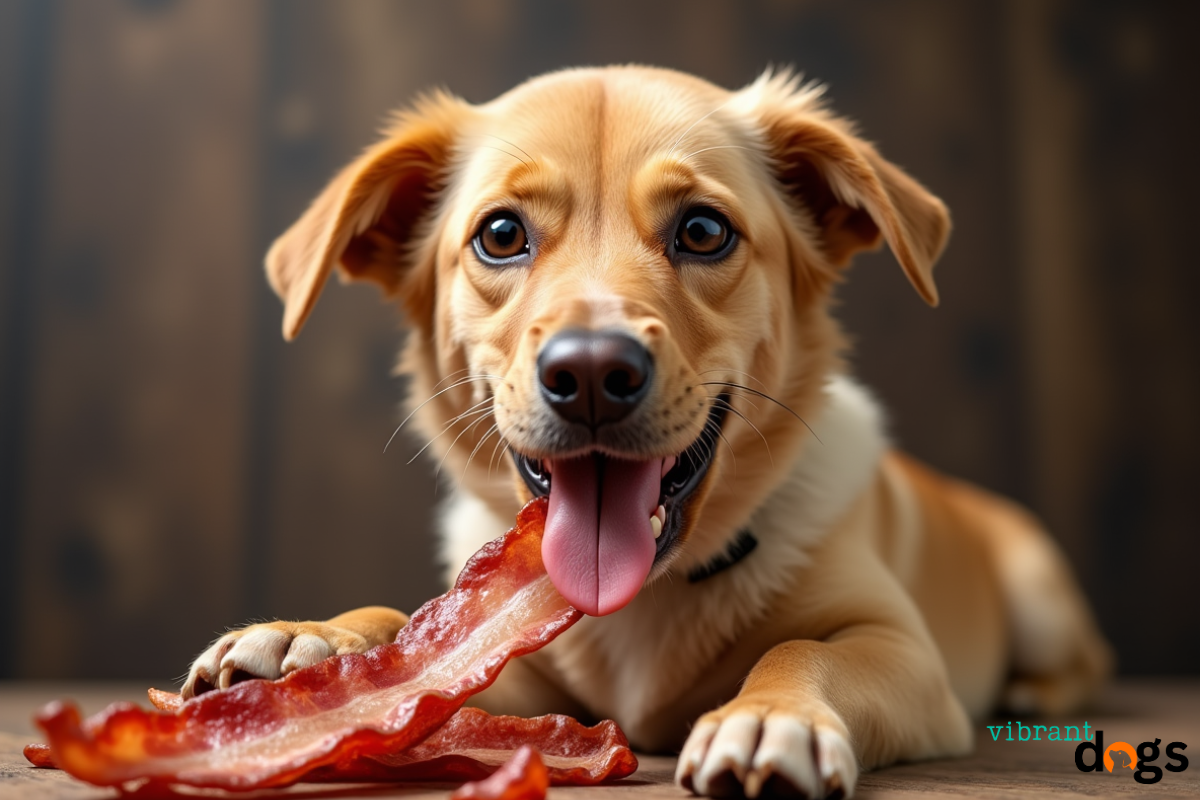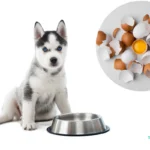Bacon is a favorite breakfast food for many, but it raises questions about its safety for dogs. As pet owners, knowing the risks and benefits of bacon for our dogs is key. This guide will help you understand bacon’s role in your dog’s diet.
Key Takeaways
- Bacon has a lot of sodium and fat, which can harm dogs if they eat too much.
- Preservatives and additives in bacon can also be risky for your dog’s health.
- Feeding bacon to your pet should be done in moderation. Always check with your vet first.
- Lean meats or dog treats are safer choices for your dog’s health than bacon.
- Knowing the risks and benefits helps you make the best choice for your dog.
Understanding the Risks of Feeding Bacon to Dogs
It might seem nice to give your dog some bacon from your breakfast. But, it’s important to know the dangers. Bacon can harm your dog’s health in serious ways.
High Sodium Content and Health Concerns
Bacon has a lot of sodium, which is bad for dogs. Too much sodium can cause dehydration and imbalance in electrolytes. This can even be deadly for dogs.
Fat Content and Digestive Issues
Bacon is also very fatty, which can upset a dog’s stomach. Eating too much fat can lead to pancreatitis, a serious condition. It can also cause diarrhea, vomiting, and other stomach problems.
Preservatives and Additives
Many bacons have preservatives and additives like nitrates and smoke flavorings. These can cause allergic reactions and upset a dog’s digestive system. They might even increase the risk of cancer in dogs.
Even a small piece of plain, cooked bacon is not always safe for dogs. But, giving bacon regularly can be very harmful. As pet owners, we must look out for our dogs’ health.
Can Dogs Eat Bacon: The Truth About This Popular Breakfast Food
Many pet owners wonder if dogs can safely eat bacon. Bacon might seem like a tasty treat, but it can be harmful to dogs. We’ll look into the facts and clear up some myths.
Bacon is not a good choice for dogs. It has too much salt, fat, and preservatives. These can cause stomach problems and serious health issues. In fact, bacon is unhealthy and can be dangerous for dogs.
The Dangers of Bacon for Dogs
- High Sodium Content: Bacon’s high salt can lead to dehydration, imbalances, and even salt poisoning in dogs.
- Excessive Fat: Bacon’s fat can cause pancreatitis, a serious condition in dogs.
- Preservatives and Additives: Bacon has preservatives like nitrites and artificial flavors, which are toxic to dogs.
While a small piece of cooked bacon might not hurt, it’s best to avoid it. The risks are too great for any benefits.
| Nutritional Comparison | Cooked Bacon (1 slice) | Dog Food (1 cup) |
|---|---|---|
| Calories | 43 | 350-400 |
| Fat (g) | 3.1 | 12-20 |
| Sodium (mg) | 195 | 300-500 |
Bacon’s nutrition is far from what dogs need. Feeding bacon to dogs can cause health problems and should be avoided.
“Bacon is a delicious treat for humans, but it should not be a part of a dog’s regular diet. The risks of feeding bacon to dogs simply outweigh any potential benefits.”
We’ll explore the health risks of bacon for dogs next. We’ll also look at safer treats for your furry friend.
The Nutritional Impact of Bacon on Your Dog’s Health
Feeding your dog the right foods is key. Bacon might seem tasty, but it’s not always good for them. Its nutritional content can harm your dog’s health.
Calories and Weight Gain
Bacon has lots of calories and fat. This can make your dog gain weight. Too much weight can hurt their joints and raise the risk of diseases like diabetes and heart issues. It’s important to watch how many calories your dog eats and only give them bacon in small amounts.
Impact on Cardiovascular Health
Bacon’s high sodium and saturated fat can harm your dog’s heart. Eating too much bacon can lead to high blood pressure and heart disease. Make sure to watch what your dog eats and talk to your vet to keep their heart healthy.
Long-term Health Effects
Eating can dogs eat pork bones and can dogs have pork bones regularly can cause long-term health problems. Bacon’s preservatives and additives may increase cancer and kidney and liver issues risks. It’s vital to focus on a balanced diet for your dog and limit processed meats like bacon.
While a little bacon won’t hurt right away, it’s important to know the risks. Choose healthier options to keep your dog healthy and happy for a long time.
Raw Bacon vs. Cooked Bacon: What’s Safer for Dogs
Feeding bacon to dogs is a big decision. You must consider raw versus cooked bacon. Each option has its own risks and benefits. Let’s look at what’s best for your dog’s health.
Raw Bacon Risks
Raw bacon can be risky for dogs. It might have Salmonella and Listeria, causing stomach problems. These bacteria can lead to vomiting, diarrhea, and serious infections. Also, raw bacon’s fat can cause pancreatitis, a serious and sometimes deadly condition.
Cooked Bacon Concerns
Cooked bacon might seem safer, but it’s not without risks. It’s often salty, which can harm a dog’s heart. Bacon also has preservatives like nitrites and nitrates. These can increase cancer risk in dogs.
The best choice is to not give bacon to your dog. Choose healthier, dog-safe proteins instead. They offer the nutrients your dog needs without the dangers.
| Comparison | Raw Bacon | Cooked Bacon |
|---|---|---|
| Bacterial Risks | High risk of Salmonella and Listeria | Reduced, but preservatives and additives can still be harmful |
| Fat Content | High, leading to potential pancreatitis | High, contributing to weight gain and cardiovascular issues |
| Sodium Content | Moderate | High, increasing the risk of hypertension |
| Overall Safety | Not recommended | Not recommended |
In conclusion, both raw and cooked bacon are risky for dogs. It’s best to avoid them. Look for safer, healthier options for your dog’s diet.
Signs of Bacon-Related Health Problems in Dogs
Bacon might taste good to your dog, but it’s not safe. As a pet owner, knowing the health risks is key. Spotting early signs helps keep your dog healthy.
Immediate Reactions to Watch For
Your dog might feel sick after eating bacon. Look out for vomiting, diarrhea, or belly pain. These signs mean their body is fighting the bacon’s fat and salt.
Long-term Health Complications
Regular bacon can harm your dog’s health over time. It can cause pancreatitis, heart disease, and obesity. These issues can really hurt your dog’s life and might need a lot of treatment.
When to Contact Your Veterinarian
If your dog shows any bad signs after bacon, call your vet fast. They can tell you what to do next. Getting help early is very important.
It’s vital to feed your dog the right food for their health. Bacon might be tempting, but your dog’s safety comes first. By watching closely and talking to your vet, you can keep your dog happy and healthy.
Safe Alternatives to Bacon for Your Dog
Bacon might be tempting, but it’s not good for your dog. It has too much salt and fat. Luckily, there are many safe and healthy treats your dog will love.
Boiled or grilled chicken is a great choice. It’s lean and easy for dogs to digest. You can shred the chicken or cut it into small pieces to make it fun for them.
Sweet potatoes are also a great option. They’re full of fiber, vitamins, and antioxidants. Try baking or steaming sweet potato slices for a tasty treat.
- Carrots: Crunchy, low-calorie, and packed with vitamins, carrots make a wonderful, dog-safe snack.
- Green beans: Steamed or raw, green beans are a low-fat, high-fiber option that dogs often enjoy.
- Cucumber slices: Refreshing and hydrating, cucumber is a safe and crunchy treat for your pup.
Always introduce new foods slowly and watch for any bad reactions. These safe treats will make your dog happy and healthy.
Understanding Pork Products and Your Dog’s Diet
Not all pork products are safe for your dog. Some can be good, while others are harmful. Knowing the difference is key to keeping your dog healthy.
Safe Pork Options
Leaner cuts like pork loin or tenderloin are good choices. They have less fat and sodium. But, avoid pork skin because it’s hard to digest and high in fat. Always cook pork well to kill harmful bacteria.
Dangerous Pork Products to Avoid
- Pork bones: Can splinter and cause internal injuries or obstruction, potentially leading to life-threatening complications.
- Raw pork: May contain parasites or bacteria like Salmonella or Listeria, posing a significant health risk to dogs.
- Processed pork: Sausages, bacon, and other cured or smoked pork products are often high in fat, sodium, and preservatives, which can be harmful to dogs.
While can dogs eat pork bones and can dogs have pork bones might seem appealing, they’re dangerous. Always talk to your vet before adding new pork items to your dog’s diet.
Conclusion
While it might be tempting to share bacon with your dog, it’s important to think twice. Bacon has too much sodium, fat, and can have harmful additives. These can be bad for your furry friend’s health.
As a caring pet owner, it’s best to keep bacon out of your dog’s diet. Look for safer options instead. This way, your dog gets the nutrients they need without risking their health.
Remember, a balanced diet is crucial for your dog’s health. Knowing the dangers of bacon can help you make better choices. This way, your dog stays happy and healthy for a long time.




